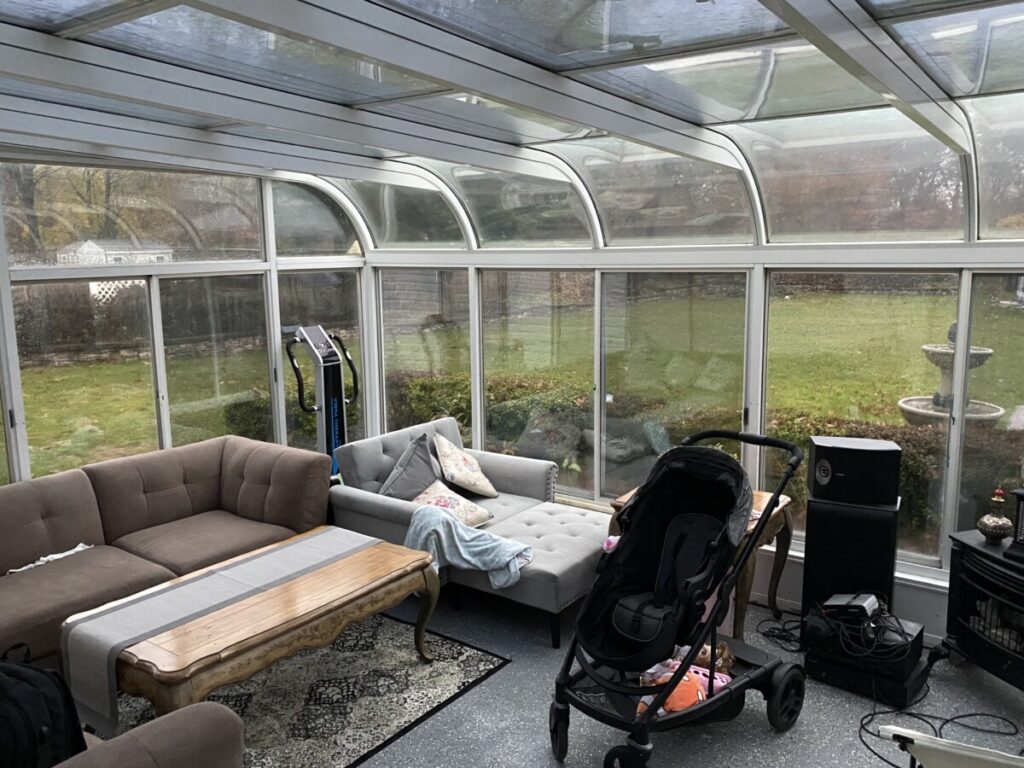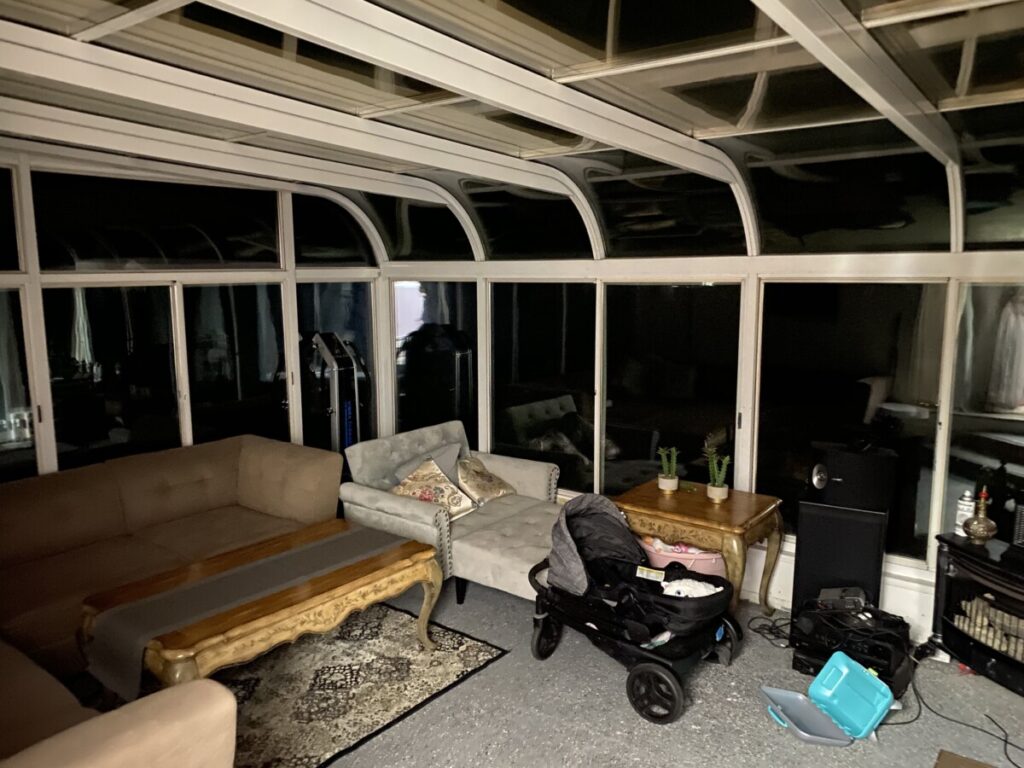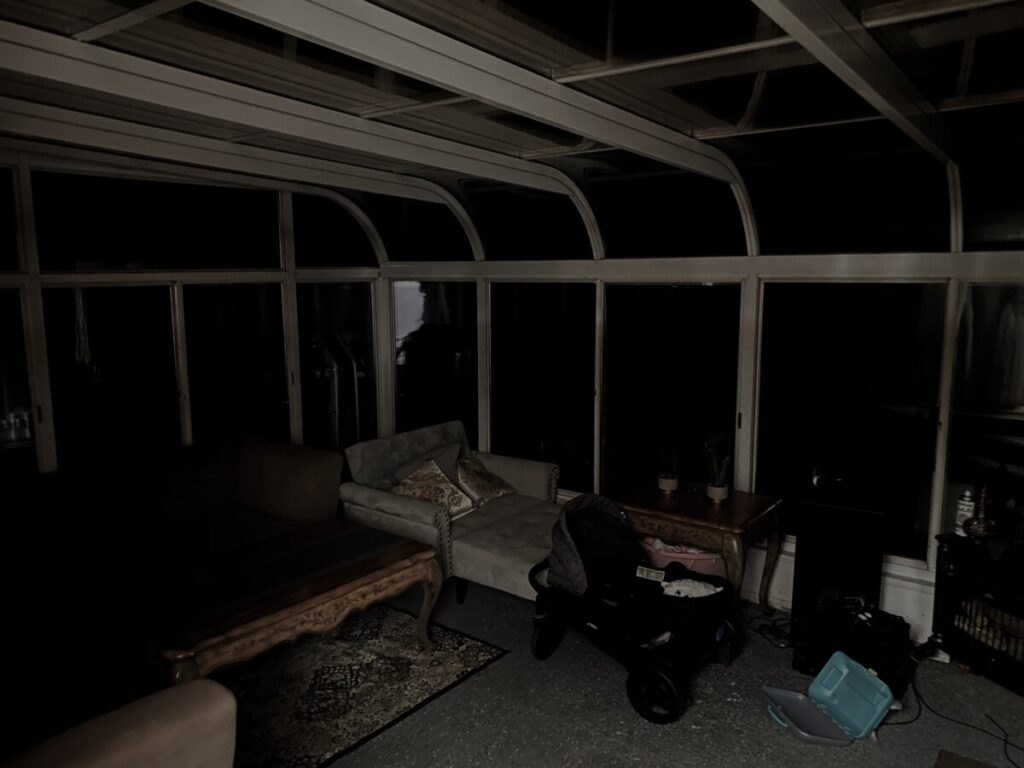Author: Fatma Oukili




The gothic space I chose for this assignment is my brother’s sunroom. I chose this space for two reasons; it fits one of the definitions for the architectural uncanny, and my fear of windows at night time. According to Vidler, the architectural uncanny “is represented by a feeling of anxiety in which there is a slippage and lack of clarity between what is homely and what is unhomely.” The sun room gives me a little bit of anxiety at night because it feels like a glass box in the middle of nowhere. It does not look or feel (in terms of energy) like the rest of the house so it has a feeling of unhomeliness, yet it is an extension of the house so it still feels a part of the home.
Vidler also states that “The very places in which we should be calm and confident (at home), we instead find ourselves unsure as to our identity, a feeling that Vidler believes emanates from fragmented, mirrored, reflecting, and transparent surfaces that we see and move through—and live within.” This room, like Vidler mentions, is a transparent room. You can see what is outside the room from the inside and what is inside the room from the outside. There is no sense of privacy which forces whoever is in the room to be in a state of vulnerability to whoever or whatever is watching them. You are being exposed from all angles, except for from below of course.
It gives me the same energy as the nursery room from The Veldt. Even though this room cannot be manipulated by one’s imagination, it still feels as though you cannot stop something if it is coming towards you. They know you are inside and you know it is outside. Even though you can go into another room, it has an idea of the house because it is able to look into it from this glass box of a room. It is also similar to Hill House in the sense that during the day there is sort of a sense of security but at night is when the vulnerable, anxious, paranoid and haunting feelings start to crawl into one’s mind.


For the first picture (which I did not take because I was not able to go) I chose Grace Church 802 Broadway New York, New York. To me this was gothic because of the pointed features and glass windows. It is layered with those features (especially the points) and the color is gloomy. In addition to the pointed arches and ornates there’s also curved and arched windows and other designs (lanset). The highest ornate also has a design that looks like a net which reminds me of feeling trapped.
The second picture for the architectural uncanny I chose this under part of a bridge. Although it is very beautiful and accented with the growing vines and branches on the side, being under (or even on) a bridge is sort of terrifying for me personally. Even though I know these bridges are built to last, the idea of something that great and big collapsing is terrifying. It is unwelcoming and cold to me to be under a bridge of ny size but especially something that mighty.
For my weekly goth I chose this song called Derailed by Joyce Manor. I chose this song because the lyrics in the end explore the darker emotions that are associated with love, contrary to how it is usually portrayed (which is in a positive, more lighthearted way). He says “Oh my god I think I’m in love, yes I know that this must be love when you ache through the days ‘cause you’ll never mend your ways.” These lyrics are speaking about and highlighting the adversities of experiencing love. I think there also may be some elements of the spirit of perverseness when they speak about crashing the toy train into buildings. The speaker in the song says “Will you buy me a train set and a hat so that I can sit alone in my room sending people away from the ones they love. Or crash them into buildings, explosions, derailments, and screaming children.” They don’t give a clear reason as to why they would do that those things, but after listening to the song a few times I concluded that it could possibly be to make others feel the way they do; to do wrong not only for the sake of doing wrong, but to make others feel what they are feeling emotionally on a more physical level. It’s an expression of their discontent.
This draft is incomplete, but I was wondering if I was going in the right direction first before continuing. Thank you!
In the ending of Dr. Jekyll and Mr. Hyde, the rest of the characters are finally aware of what is going on with Dr. Jekyll and Mr. Hyde; they find out that they are one individual instead of two. This is made clear in the letter Dr. Jekyll writes to Utterson when he explains the process of exploring his darker nature which he states he has had to conceal all his life. By finding a way to transform into Mr. Hyde, he does not feel guilty or wrong for committing heinous and criminal acts. Although, after a couple of months, Jekyll learns that he is not able to control the switch that occurs between him and Hyde anymore and realizes the only way to end this is to end Hyde’s life which is also his own.
Redemption, according to the Oxford dictionary, is the act of saving or being saved from sin, error, or evil. In the ending, you can say that both Jekyll and Hyde were both redeemed. I say both and not just one because although it is one person, they are referred to as two separate entities; Jekyll physically and sort of mentally becomes a different person when turning into Hyde even though he acknowledges the fact that it is still his own evil side. Jekyll killing himself means that he is also killing Hyde and therefore saving himself from committing sin or being evil since Hyde is his evil self. The error that is corrected is Jekyll putting a stop to his own evil that he brought out with the medicine he created. This is an error because it is a disruption of the natural order or intended outcome for Jekyll’s control over the transformation of his two selves.
Since killing himself also means killing someone else, Jekyll can be seen as redeeming Hyde from sin and evil. Hyde dying means he will no longer be able to overpower Jekyll’s body and mental state, which is his only vessel that allows Hyde to execute his malicious acts.
In chapter 3, Mr. Utterson goes to visit Dr. Jekyll. After their dinner the two talk at length and Mr. Utterson takes this time to share his dissent for Dr. Jekyll’s will while also attempting to question him and get more information on his relationship with Mr. Hyde. Although Dr. Jekyll does not give a lot of (or any) information on his relationship with Mr. Hyde he does tell Mr. Utterson, “’I only ask for justice; I only ask you to help him for my sake, when I am no longer here.’” The “him” that Dr. Jekyll is referring to is Mr. Hyde.
This is ironic because in the story previously told by Mr. Enfield, Mr. Hyde is the villain of the incident; Dr. Jekyll’s wording implies that Mr. Hyde is actually the victim in a situation (since he does not specify which), needs to be protected, and needs justice when Dr. Jekyll is no longer able to be around to protect him. This is also ironic because in later chapters we learn that he has committed another crime (he kills a man).
This summer I did not do anything that was surprised or scared me. The majority of the time my family and I stayed home because of the pandemic. There was nothing exciting or motivating to do outside that would have also followed the social distancing rules that I would have been interested in. The one thing I guess I would say made me feel good was taking a summer class so I would not have to take it during the fall or spring semester. It was stressful but I felt good after knowing I passed it.
Of the three stories, my favorite was The Black Cat by Edgar Allan Poe. I think this one was my favorite because of how dramatic the writing is. When I was reading I noticed how the words are chosen to manipulate the reader’s emotion and also change with the narrator’s perspective. The story is chaotic but I liked its chaos because when reading or watching something chaotic there is a relief at the end of the story that this isn’t your reality; the chaos ends with the last sentence. This is the only story, for me, out of the three that made me pay close attention to the word choice; that was most likely because I had to read sentences a couple times before understanding what they meant but in doing so I realized different things each time I reread.
I liked the narrator’s reasoning as to why he did cruel things; not because I agreed with those things but because it was interesting to see someone try to justify cruel and evil acts as if it were something everyone does regularly. I’m referring to when he speaks about the spirit of perverseness. The narrator introduces this by saying “Who has not, a hundred times, found himself committing a vile or a stupid action, for no other reason than because he know he should not?”. The way they word it makes it seem as though everyone does these things, and therefore since you have possibly fallen victim to this ideology, you are not in a place to judge what the narrator has done out of perverseness as well. I think this type of manipulation of the reading is interesting and makes me question other events in the story. It was spooky and mysterious which I really liked.


